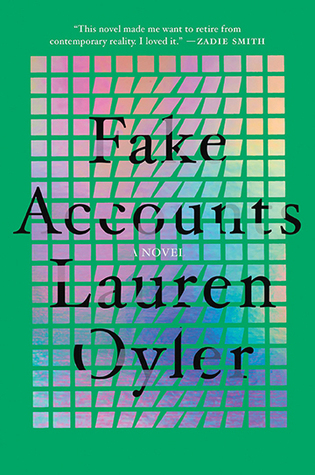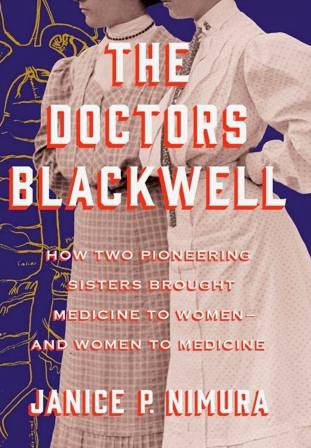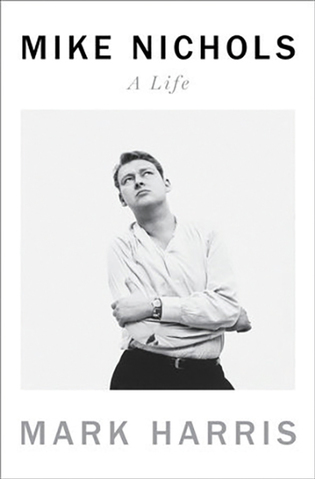
Fake Accounts
Lauren Oyler ’12
Catapult, $26
Reviewed by Debra Spark ’84
Would you want to read a novel that is the equivalent of looking at someone focused on an iPhone, but with the very thing you don’t have when observing in real life: all the fizzy pops of thought in the user’s head?
Depends on what the person is looking at, presumably, and the level of fizz, right?
The narrator of Lauren Oyler’s debut novel, Fake Accounts, is a smart young woman from Brooklyn, who “teeters” (as she herself acknowledges) “on the border between likeable and loathsome.” During an internet snooping session, she discovers that her boyfriend is a secret online conspiracy theorist. Days later, at the 2017 Women’s March in DC, and having vowed to break up with him (with both vicious delight and irritation that he hasn’t been texting her), the narrator learns something else upsetting about Felix. In reaction to this second surprise, and thanks to some financial sleight of hand, the narrator quits her media industry job and heads for Berlin, where she does nothing much but online dating. The focus, though, is less on the particulars of her life than the fizz in her head, which is plenty fizzy.
Oyler is a terrific writer, her long propulsive sentences featuring one mordant comment after another, so that even a reader wholly uninterested in social media will enjoy the obsessive analysis of online behavior and contemporary culture. Oyler’s narrator is cutting, but she doesn’t let herself, or even the novel, off the hook. One of the novel’s (many) fun meta-fictional conceits is “the ex-boyfriends” who function as the narrator’s inner Greek chorus. Late in the book, Oyler describes the ex-boyfriends as feeling “some obligation to finish [reading her novel], having gotten this far, but they have to admit, they’re looking forward to reading other things.” I was feeling much the same way at that particular moment in the narrative—heavy on the details of the OkCupid dates—but the joke reminded me of why I wanted to press on: Oyler is extremely funny, with a spot-on critical eye. While the narrative is most compelling and unpredictable in the first third of this clever book, the verbal pyrotechnics, super-astute observations, and insightful descriptions of place and people are on every page.
Debra Spark’s most recent books are And Then Something Happened: Essays on Fiction Writing and the novel Unknown Caller.

The Doctors Blackwell: How Two Pioneering Sisters Brought Medicine to Women and Women to Medicine
Janice P. Nimura ’93
W. W. Norton, $27.95
Reviewed by Randi Hutter Epstein ’90MD
In the fall of 1847, Dr. Charles A. Lee, the dean of faculty at Geneva Medical College in upstate New York, announced that he had received “the most extraordinary request which had ever been made to the faculty.”
A woman had applied for admission. She had already been rejected from several prominent medical schools, but Lee decided to put her fate up to an election and 113 of her potential classmates voted.
The young men figured it was a prank and went along with it. All but one of them hollered “Aye!”
Much to their shock and chagrin, three weeks later Elizabeth Blackwell, a thin, quiet girl from Ohio, joined their ranks. “At best, for Elizabeth it was a vindication and a beginning. At worst, it was a freakish experiment her professors would live to regret,” writes Janice P. Nimura ’93 in her scrupulously researched book, The Doctors Blackwell.
Writing with poetic flair, Nimura frames the book around the arduous journeys of both Elizabeth Blackwell, who in 1849 became the first woman in the US to earn an MD, and her younger sister, Emily, who received her MD five years later. Emily—portrayed here as the more skilled but less celebrated sister—is often a minor player in the Blackwell story simply because she wasn’t first. That alone makes this book a richer read than others. We get insight into these two female pioneers, prickly personalities devoted to and competitive with each other.
Still, The Doctors Blackwell is so much more than two sisters escaping the suffocating confines of nineteenth-century womanhood. Nimura brings readers on a journey into the healthcare landscape of the middle and late 1800s, when doctoring was barely a profession. As she puts it, medicine was “more manual than cerebral, vulnerable to the taint of patent-remedy hucksters.” Since then, medical advances have turned many killer diseases into ailments that are curable, and women now make up more than half of the medical school classes. “It is for us to do our part,” Emily Blackwell once said, “that hereafter the old and time-honored profession may be proud of her daughters as of her sons.”
Randi Hutter Epstein ’90MD is the Writer in Residence at the Yale School of Medicine and the author of Aroused: The History of Hormones and How They Control Just About Everything.

Mike Nichols: A Life
Mark Harris ’85
Penguin Press, $35
Reviewed by Mark Blankenship ’05MFA
It was never easy being Mike Nichols. That’s the truth running through Mark Harris’s beautifully crafted biography, Mike Nichols: A Life. For every page that details his incredible career, glamorous lifestyle, and profound impact on almost all his collaborators, there are at least two more that explain how his insecurity, belligerence, and lack of self-awareness plagued him until he died.
But because Nichols was such a sensitive and intelligent person—and because Harris depicts that side of him so well—it’s still easy to root for him through all his setbacks. He seems less like an intimidating cultural icon than a vital and frustrating person we can actually know.
Thanks to a trove of research and a vast array of interviews with Nichols’s family and collaborators, Harris lets the highs and lows feel equally vivid. Candid statements from Meryl Streep and Cher, for instance, make it clear that as a director, his graciousness and curiosity turned the set of the movie Silkwood into a type of artistic paradise. But just a few chapters later, a crew member on the film Regarding Henry recalls his fit after he decided the caviar in a scene wasn›t fancy enough.
It goes that way until the book ends, with Nichols’s death in 2014. But Harris never lets either extreme dominate his narrative. Readers are invited to make their own conclusions about the contradictory figure in front of them. And no matter their verdict, film and theater lovers will savor the exploration of Nichols’s legendary comic partnership with Elaine May, his decades of work directing Neil Simon’s plays, and his still-influential films, such as The Graduate, Who’s Afraid of Virginia Woolf?, and Angels in America.
Mark Blankenship ’05MFA is the editor of The Flashpaper and the coauthor of Madonna: A to Z.
 loading
loading

